Microbiology Assistant Professor Named Among the First Pittman Scholars
By:
Published Date: Jan 30
 Beatriz Leon, Ph.D., is one of the five Pittman Scholars for 2015. As a Pittman Scholar, Leon is appointed as an endowed scholar for five years. She will receive additional funding to support her research-related activities or scholarly enrichment.
Beatriz Leon, Ph.D., is one of the five Pittman Scholars for 2015. As a Pittman Scholar, Leon is appointed as an endowed scholar for five years. She will receive additional funding to support her research-related activities or scholarly enrichment.
The Pittman Scholars Program was created to “support the recruitment and retention of up to five highly competitive junior faculty members each year either to basic science or clinical departments,” explains Selwyn Vickers, M.D., Senior VP & Dean in the School of Medicine. “The purpose of the Pittman Scholars program is to identify and nurture tomorrow’s best physicians and scientists, and to reward their efforts with additional resources that support their goals.”
Eligibility for this highly competitive award is restricted to NIH-funded early career scientists who are within five years of their initial appointment to assistant professor position (tenure or non-tenure earning).
The other 2015 Pittman Scholars are:
Andre Ballesteros-Tato, Ph.D., Division Clinical Immunology and Rheumatology, Department of Medicine
Lizhong Wang, Ph.D., Department of Genetics
Michael Wells, M.D., Division of Pulmonary, Allergy and Clinical Care Medicine, Department of Medicine
Adam Wende, Ph.D., Department of Pathology
“I'm glad to see the microbiology department represented in this group and hope that we will be in the running every year,” says Frances Lund, Ph.D., Chair, UAB Microbiology Department.
Read more
 Beatriz Leon, Ph.D., is one of the five Pittman Scholars for 2015. As a Pittman Scholar, Leon is appointed as an endowed scholar for five years. She will receive additional funding to support her research-related activities or scholarly enrichment.
Beatriz Leon, Ph.D., is one of the five Pittman Scholars for 2015. As a Pittman Scholar, Leon is appointed as an endowed scholar for five years. She will receive additional funding to support her research-related activities or scholarly enrichment.The Pittman Scholars Program was created to “support the recruitment and retention of up to five highly competitive junior faculty members each year either to basic science or clinical departments,” explains Selwyn Vickers, M.D., Senior VP & Dean in the School of Medicine. “The purpose of the Pittman Scholars program is to identify and nurture tomorrow’s best physicians and scientists, and to reward their efforts with additional resources that support their goals.”
Eligibility for this highly competitive award is restricted to NIH-funded early career scientists who are within five years of their initial appointment to assistant professor position (tenure or non-tenure earning).
The other 2015 Pittman Scholars are:
Andre Ballesteros-Tato, Ph.D., Division Clinical Immunology and Rheumatology, Department of Medicine
Lizhong Wang, Ph.D., Department of Genetics
Michael Wells, M.D., Division of Pulmonary, Allergy and Clinical Care Medicine, Department of Medicine
Adam Wende, Ph.D., Department of Pathology
“I'm glad to see the microbiology department represented in this group and hope that we will be in the running every year,” says Frances Lund, Ph.D., Chair, UAB Microbiology Department.
Read more
Micro Researchers Partner with Kypha, Inc. to Develop First Rapid Test for Bacterial Meningitis
By:
Published Date: Jan 23
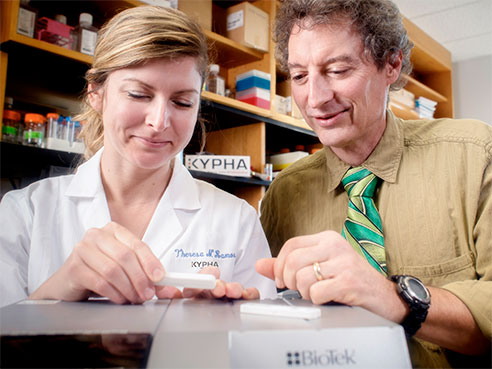 Scott Barnum, Ph.D., and postdoctoral fellow Theresa Ramos, Ph.D., have partnered with Kypha Inc., a St. Louis-based company focused on complement proteins and lateral flow assays, to develop a diagnostic test to rapidly and inexpensively discriminate between bacterial and viral meningitis. This kind of test would be a valuable tool for the emergency room physician, according to Barnum.
Scott Barnum, Ph.D., and postdoctoral fellow Theresa Ramos, Ph.D., have partnered with Kypha Inc., a St. Louis-based company focused on complement proteins and lateral flow assays, to develop a diagnostic test to rapidly and inexpensively discriminate between bacterial and viral meningitis. This kind of test would be a valuable tool for the emergency room physician, according to Barnum.
Read more:
“UAB, industry partnership could lead to first rapid test for bacterial meningitis,” by Nicole Wyatt. UAB School of Medicine News, January 21, 2015.
"This simple meningitis test could save money and lives—and open a new window on inflammation," by Matt Windsor. The Mix, January 23, 2015.
 Scott Barnum, Ph.D., and postdoctoral fellow Theresa Ramos, Ph.D., have partnered with Kypha Inc., a St. Louis-based company focused on complement proteins and lateral flow assays, to develop a diagnostic test to rapidly and inexpensively discriminate between bacterial and viral meningitis. This kind of test would be a valuable tool for the emergency room physician, according to Barnum.
Scott Barnum, Ph.D., and postdoctoral fellow Theresa Ramos, Ph.D., have partnered with Kypha Inc., a St. Louis-based company focused on complement proteins and lateral flow assays, to develop a diagnostic test to rapidly and inexpensively discriminate between bacterial and viral meningitis. This kind of test would be a valuable tool for the emergency room physician, according to Barnum.Read more:
“UAB, industry partnership could lead to first rapid test for bacterial meningitis,” by Nicole Wyatt. UAB School of Medicine News, January 21, 2015.
"This simple meningitis test could save money and lives—and open a new window on inflammation," by Matt Windsor. The Mix, January 23, 2015.
Ramos UAB’s First “Corporate Postdoctoral Fellow”
By:
Published Date: Jan 20
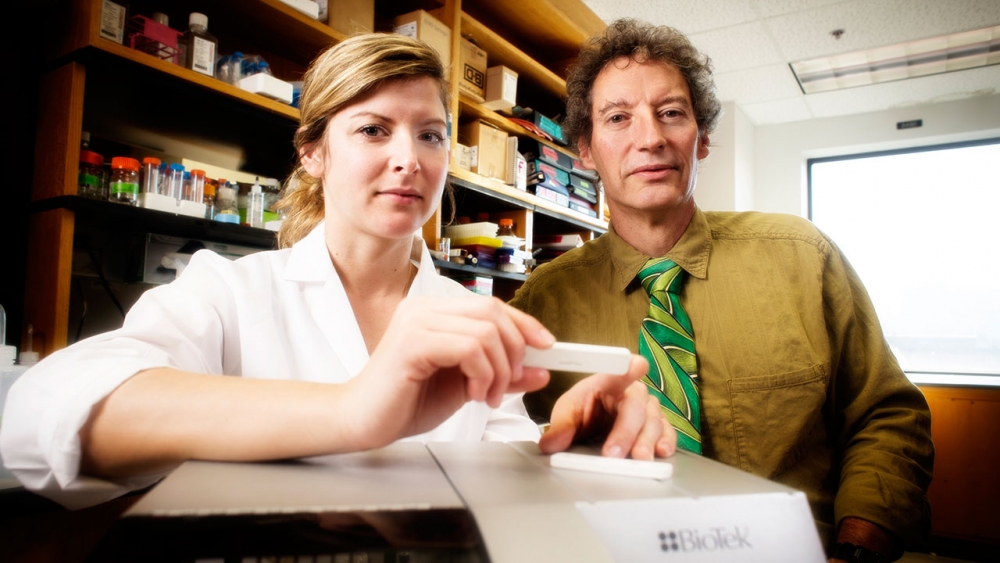 Theresa Ramos, Ph.D., (left) and her mentor, Scott Barnum, Ph.D. (right) have partnered with a start-up biotech company, Kypha Inc., on the development of a rapid diagnostic device for meningitis and other conditions. Ramos is UAB’s first “corporate postdoctoral fellow” and holds the title of Postdoctoral Entrepreneur at Kypha. She also manages Kypha’s beta testing site at UAB, encompassing other potential projects with UAB’s Institute Innovation and Entrepreneurship.
Theresa Ramos, Ph.D., (left) and her mentor, Scott Barnum, Ph.D. (right) have partnered with a start-up biotech company, Kypha Inc., on the development of a rapid diagnostic device for meningitis and other conditions. Ramos is UAB’s first “corporate postdoctoral fellow” and holds the title of Postdoctoral Entrepreneur at Kypha. She also manages Kypha’s beta testing site at UAB, encompassing other potential projects with UAB’s Institute Innovation and Entrepreneurship.
Read more
 Theresa Ramos, Ph.D., (left) and her mentor, Scott Barnum, Ph.D. (right) have partnered with a start-up biotech company, Kypha Inc., on the development of a rapid diagnostic device for meningitis and other conditions. Ramos is UAB’s first “corporate postdoctoral fellow” and holds the title of Postdoctoral Entrepreneur at Kypha. She also manages Kypha’s beta testing site at UAB, encompassing other potential projects with UAB’s Institute Innovation and Entrepreneurship.
Theresa Ramos, Ph.D., (left) and her mentor, Scott Barnum, Ph.D. (right) have partnered with a start-up biotech company, Kypha Inc., on the development of a rapid diagnostic device for meningitis and other conditions. Ramos is UAB’s first “corporate postdoctoral fellow” and holds the title of Postdoctoral Entrepreneur at Kypha. She also manages Kypha’s beta testing site at UAB, encompassing other potential projects with UAB’s Institute Innovation and Entrepreneurship.Read more
Micro Wins Awards in 2014 CFAR Research Day Poster Competition
By:
Published Date: Dec 12
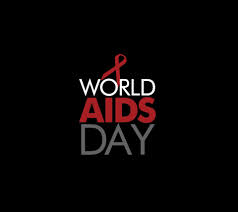 More than 130 investigators, students and staff interested in HIV, global health and infectious diseases research gathered at UAB on December 11, 2014, to celebrate World AIDS Day. CFAR Director Michael Saag presented the State of the CFAR, and a Research Poster Competition rounded out the event. Four of the five of the monetary awards for project funding went to teams directed by microbiology department faculty.
More than 130 investigators, students and staff interested in HIV, global health and infectious diseases research gathered at UAB on December 11, 2014, to celebrate World AIDS Day. CFAR Director Michael Saag presented the State of the CFAR, and a Research Poster Competition rounded out the event. Four of the five of the monetary awards for project funding went to teams directed by microbiology department faculty.
FIRST PLACE ($4000 funding + $250 prize)
A novel approach to generate HIV-1 broadly neutralizing antibodies
Team: Jan Novak, Zina Moldoveanu, Hui Hu, Matthew Renfro, Jialan Geng, Hairong Wei, Bi Shi, Qing Wei, Milan Raska, Audra Laube, Bara Knoppova
SECOND PLACE ($2000 funding + $125 prize)
Novel copper-coordinating small molecule inhibitors against methicillin resistant stphylococcus aureus
Team: Suzanne Michalek, Olaf Kutsch, Frank Wolschendorf, Santosh Shah, Alex Dalecki, Kaitlyn Schaaf
PEOPLE'S CHOICE ($1000 funding + $75 prize)
Engineer the CRISPR/Cas9 system to clear pathogenic DNA virus infections in AIDS patients
Team: George Luo, Mengxi Jiang, Joshua Justice
*SPECIAL GLOBAL HEALTH AWARD ($4000 funding + $250 prize)
Isolation of human antibodies for the treatment of fungal infections
Team: John Kearney, Rodney Glenn King, Emily Stefanov
 More than 130 investigators, students and staff interested in HIV, global health and infectious diseases research gathered at UAB on December 11, 2014, to celebrate World AIDS Day. CFAR Director Michael Saag presented the State of the CFAR, and a Research Poster Competition rounded out the event. Four of the five of the monetary awards for project funding went to teams directed by microbiology department faculty.
More than 130 investigators, students and staff interested in HIV, global health and infectious diseases research gathered at UAB on December 11, 2014, to celebrate World AIDS Day. CFAR Director Michael Saag presented the State of the CFAR, and a Research Poster Competition rounded out the event. Four of the five of the monetary awards for project funding went to teams directed by microbiology department faculty.FIRST PLACE ($4000 funding + $250 prize)
A novel approach to generate HIV-1 broadly neutralizing antibodies
Team: Jan Novak, Zina Moldoveanu, Hui Hu, Matthew Renfro, Jialan Geng, Hairong Wei, Bi Shi, Qing Wei, Milan Raska, Audra Laube, Bara Knoppova
SECOND PLACE ($2000 funding + $125 prize)
Novel copper-coordinating small molecule inhibitors against methicillin resistant stphylococcus aureus
Team: Suzanne Michalek, Olaf Kutsch, Frank Wolschendorf, Santosh Shah, Alex Dalecki, Kaitlyn Schaaf
PEOPLE'S CHOICE ($1000 funding + $75 prize)
Engineer the CRISPR/Cas9 system to clear pathogenic DNA virus infections in AIDS patients
Team: George Luo, Mengxi Jiang, Joshua Justice
*SPECIAL GLOBAL HEALTH AWARD ($4000 funding + $250 prize)
Isolation of human antibodies for the treatment of fungal infections
Team: John Kearney, Rodney Glenn King, Emily Stefanov
Mentors Change Lives
By:
Published Date: Nov 25
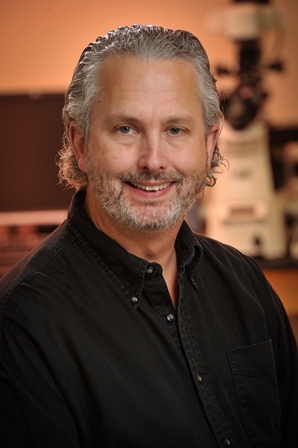 In a November 18, 2014, article in GEN (Genetic Engineering & Biotechnology News), Susanna F. Greer, Ph.D., says microbiology professor Louis Justement, Ph.D., changed her life.
In a November 18, 2014, article in GEN (Genetic Engineering & Biotechnology News), Susanna F. Greer, Ph.D., says microbiology professor Louis Justement, Ph.D., changed her life.
As an undergraduate chemistry major in the 1990s, Greer spent a summer doing biomedical research in Justement’s lab at the University of Texas Medical Branch at Galveston. This initial encounter led Greer to choose a career in research. She is currently associate professor of biology at Georgia State University, specializing in transcriptional and epigenetic regulation of immune response and cancer immunology.
Justement, who chairs the Training and Career Opportunities Subcommittee of the Federation for American Societies for Experimental Biology, continues to change the lives of students here at UAB.
Read Susanna Greer’s thoughts about mentoring in “Making Mentoring Meaningful.”
 In a November 18, 2014, article in GEN (Genetic Engineering & Biotechnology News), Susanna F. Greer, Ph.D., says microbiology professor Louis Justement, Ph.D., changed her life.
In a November 18, 2014, article in GEN (Genetic Engineering & Biotechnology News), Susanna F. Greer, Ph.D., says microbiology professor Louis Justement, Ph.D., changed her life.As an undergraduate chemistry major in the 1990s, Greer spent a summer doing biomedical research in Justement’s lab at the University of Texas Medical Branch at Galveston. This initial encounter led Greer to choose a career in research. She is currently associate professor of biology at Georgia State University, specializing in transcriptional and epigenetic regulation of immune response and cancer immunology.
Justement, who chairs the Training and Career Opportunities Subcommittee of the Federation for American Societies for Experimental Biology, continues to change the lives of students here at UAB.
Read Susanna Greer’s thoughts about mentoring in “Making Mentoring Meaningful.”
Microbiology Researchers Work to Find a Cure
By:
Published Date: Nov 24
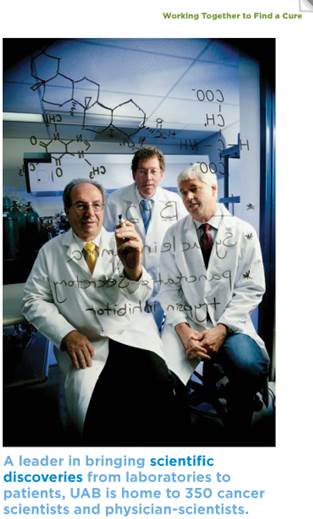 The UAB Comprehensive Cancer Center, a National Cancer Institute-designated comprehensive facility, is known as a leader in bringing scientific discoveries from laboratories to patients. It is home to more than 350 scientists and physician-scientists—many who are in the UAB Department of Microbiology. These scientists are focusing their research on the basic mechanisms of cancer pathogenesis.
The UAB Comprehensive Cancer Center, a National Cancer Institute-designated comprehensive facility, is known as a leader in bringing scientific discoveries from laboratories to patients. It is home to more than 350 scientists and physician-scientists—many who are in the UAB Department of Microbiology. These scientists are focusing their research on the basic mechanisms of cancer pathogenesis.
An October 2014 US Airways article, “UAB: A Center for Healing,” features the UAB Comprehensive Cancer Center and is illustrated with a photograph of UAB Microbiology Department professor Christopher Klug, Ph.D.
 The UAB Comprehensive Cancer Center, a National Cancer Institute-designated comprehensive facility, is known as a leader in bringing scientific discoveries from laboratories to patients. It is home to more than 350 scientists and physician-scientists—many who are in the UAB Department of Microbiology. These scientists are focusing their research on the basic mechanisms of cancer pathogenesis.
The UAB Comprehensive Cancer Center, a National Cancer Institute-designated comprehensive facility, is known as a leader in bringing scientific discoveries from laboratories to patients. It is home to more than 350 scientists and physician-scientists—many who are in the UAB Department of Microbiology. These scientists are focusing their research on the basic mechanisms of cancer pathogenesis.An October 2014 US Airways article, “UAB: A Center for Healing,” features the UAB Comprehensive Cancer Center and is illustrated with a photograph of UAB Microbiology Department professor Christopher Klug, Ph.D.
Microbiology department plays major role in probing control of viral infections
By:
Published Date: Nov 21
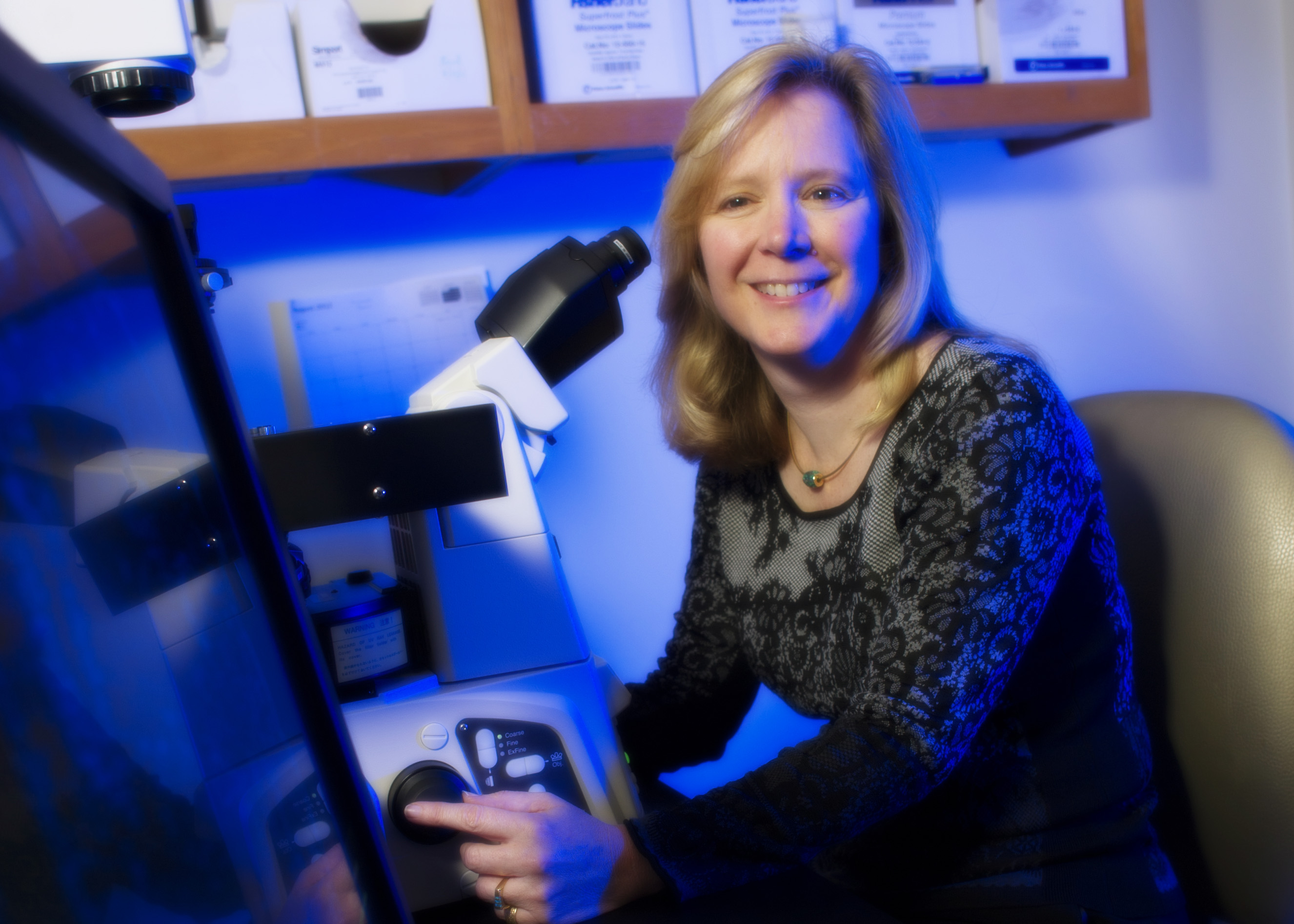 The lab of Frances Lund, Ph.D., chair of the UAB Department of Microbiology, is looking at a cell-fate step in B cells after they have proliferated. She wants to understand the switch from rapid cell division to a cell that starts to manufacture antibody molecules. The cytokine interferon-gamma (IFN-gamma) has been implicated in that cell-fate decision, which leads to a fork in the road — most of the B cells make a lot of antibody and then die, but others become long-lived antibody-secreting cells that can produce protective antibodies for decades.
The lab of Frances Lund, Ph.D., chair of the UAB Department of Microbiology, is looking at a cell-fate step in B cells after they have proliferated. She wants to understand the switch from rapid cell division to a cell that starts to manufacture antibody molecules. The cytokine interferon-gamma (IFN-gamma) has been implicated in that cell-fate decision, which leads to a fork in the road — most of the B cells make a lot of antibody and then die, but others become long-lived antibody-secreting cells that can produce protective antibodies for decades.
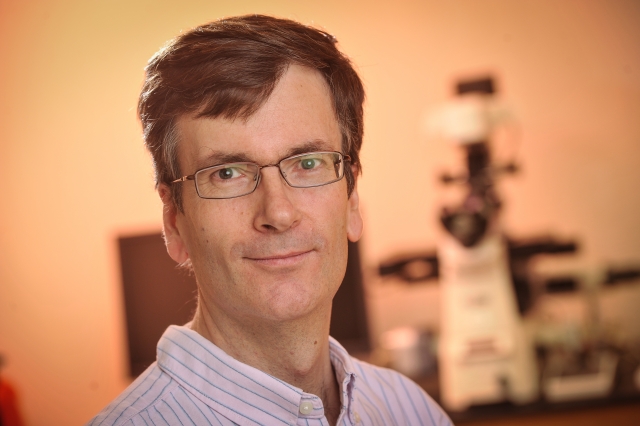 The lab of Allan Zajac, Ph.D., associate professor of microbiology at UAB, is looking at CD8 T cells, which can develop into the classic “killer” T cells that can destroy virus-infected cells. A cell-surface adhesion molecule called ICAM seems to direct the type of T cell produced after cell-to-cell interactions — some of the CD8 T cells become killer T cells, and others become long-lived memory T cells. Zajac believes that ICAM limits the amount of IL-2 experienced by some clustered T cells, and this helps produce memory cells rather than killer cells. Zajac has two versions of lymphocytic choriomeningitis virus that differ by only two nucleotides — one causes an acute infection in mice that is quelled in 10 days, while the other, faster-replicating virus gets out of control and exhausts the immune system, and the mice take months to recover.
The lab of Allan Zajac, Ph.D., associate professor of microbiology at UAB, is looking at CD8 T cells, which can develop into the classic “killer” T cells that can destroy virus-infected cells. A cell-surface adhesion molecule called ICAM seems to direct the type of T cell produced after cell-to-cell interactions — some of the CD8 T cells become killer T cells, and others become long-lived memory T cells. Zajac believes that ICAM limits the amount of IL-2 experienced by some clustered T cells, and this helps produce memory cells rather than killer cells. Zajac has two versions of lymphocytic choriomeningitis virus that differ by only two nucleotides — one causes an acute infection in mice that is quelled in 10 days, while the other, faster-replicating virus gets out of control and exhausts the immune system, and the mice take months to recover.
Click here for the rest of the story -- “$10 million UAB grant is probing control of viral infections”
 The lab of Frances Lund, Ph.D., chair of the UAB Department of Microbiology, is looking at a cell-fate step in B cells after they have proliferated. She wants to understand the switch from rapid cell division to a cell that starts to manufacture antibody molecules. The cytokine interferon-gamma (IFN-gamma) has been implicated in that cell-fate decision, which leads to a fork in the road — most of the B cells make a lot of antibody and then die, but others become long-lived antibody-secreting cells that can produce protective antibodies for decades.
The lab of Frances Lund, Ph.D., chair of the UAB Department of Microbiology, is looking at a cell-fate step in B cells after they have proliferated. She wants to understand the switch from rapid cell division to a cell that starts to manufacture antibody molecules. The cytokine interferon-gamma (IFN-gamma) has been implicated in that cell-fate decision, which leads to a fork in the road — most of the B cells make a lot of antibody and then die, but others become long-lived antibody-secreting cells that can produce protective antibodies for decades. The lab of Allan Zajac, Ph.D., associate professor of microbiology at UAB, is looking at CD8 T cells, which can develop into the classic “killer” T cells that can destroy virus-infected cells. A cell-surface adhesion molecule called ICAM seems to direct the type of T cell produced after cell-to-cell interactions — some of the CD8 T cells become killer T cells, and others become long-lived memory T cells. Zajac believes that ICAM limits the amount of IL-2 experienced by some clustered T cells, and this helps produce memory cells rather than killer cells. Zajac has two versions of lymphocytic choriomeningitis virus that differ by only two nucleotides — one causes an acute infection in mice that is quelled in 10 days, while the other, faster-replicating virus gets out of control and exhausts the immune system, and the mice take months to recover.
The lab of Allan Zajac, Ph.D., associate professor of microbiology at UAB, is looking at CD8 T cells, which can develop into the classic “killer” T cells that can destroy virus-infected cells. A cell-surface adhesion molecule called ICAM seems to direct the type of T cell produced after cell-to-cell interactions — some of the CD8 T cells become killer T cells, and others become long-lived memory T cells. Zajac believes that ICAM limits the amount of IL-2 experienced by some clustered T cells, and this helps produce memory cells rather than killer cells. Zajac has two versions of lymphocytic choriomeningitis virus that differ by only two nucleotides — one causes an acute infection in mice that is quelled in 10 days, while the other, faster-replicating virus gets out of control and exhausts the immune system, and the mice take months to recover.Click here for the rest of the story -- “$10 million UAB grant is probing control of viral infections”
23rd Annual Microbiology Research Retreat
By:
Published Date: Nov 05
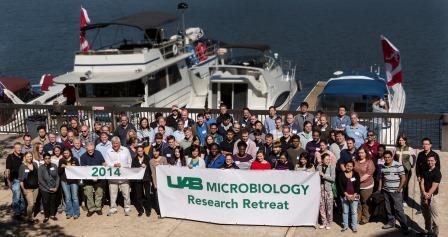 by Peter Burrows, Ph.D.
by Peter Burrows, Ph.D.
October 17-19, 2014, microbiology department faculty, and special guests gathered at Alabama’s beautiful Joe Wheeler State Park for the annual microbiology department retreat. This has always been one of our favorite retreat venues because of its convenient (about 2 hours from Birmingham) and beautiful location near Rogersville, Alabama, on Wheeler Lake, a 60 mile long body of water created by Wheeler Dam along the Tennessee River. This year’s retreat was a wonderful opportunity for students, faculty and postdocs to focus on science and to establish new collaborations away from the distractions of everyday life. The weather this year could not have been better. An added treat was the unveiling of the new microbiology department T-shirt during the retreat registration. Images on the shirt were provided by microbiology graduate student Shane Kelly (Bedwell lab) and depicted squamous epithelial cells isolated from the buccal mucosa of the cheek. Shane’s artwork was awarded Judge’s Choice in the 2014 UAB School of Medicine Art Show.
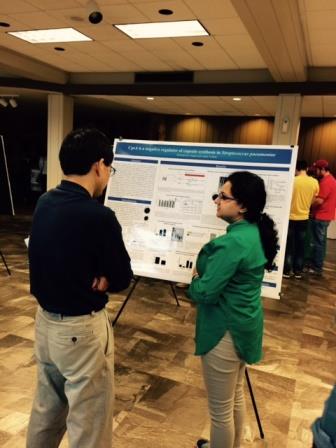 The retreat began on Friday afternoon with scientific talks by students and postdocs. Roughly organized into themes, Mycobacterium tuberculosis, gene expression, host defense and immunity, and virology, the talks were varied and interesting and were followed by lively question and answer sessions. Friday evening was reserved for a poster session with 26 trainees presenting their research. Student and postdoc presentations continued on Saturday morning. Faculty judges of the oral and poster presentations uniformly agreed that this was a very difficult assignment due to the overall high quality of both talks and posters.
The retreat began on Friday afternoon with scientific talks by students and postdocs. Roughly organized into themes, Mycobacterium tuberculosis, gene expression, host defense and immunity, and virology, the talks were varied and interesting and were followed by lively question and answer sessions. Friday evening was reserved for a poster session with 26 trainees presenting their research. Student and postdoc presentations continued on Saturday morning. Faculty judges of the oral and poster presentations uniformly agreed that this was a very difficult assignment due to the overall high quality of both talks and posters.

October 17-19, 2014, microbiology department faculty, and special guests gathered at Alabama’s beautiful Joe Wheeler State Park for the annual microbiology department retreat. This has always been one of our favorite retreat venues because of its convenient (about 2 hours from Birmingham) and beautiful location near Rogersville, Alabama, on Wheeler Lake, a 60 mile long body of water created by Wheeler Dam along the Tennessee River. This year’s retreat was a wonderful opportunity for students, faculty and postdocs to focus on science and to establish new collaborations away from the distractions of everyday life. The weather this year could not have been better. An added treat was the unveiling of the new microbiology department T-shirt during the retreat registration. Images on the shirt were provided by microbiology graduate student Shane Kelly (Bedwell lab) and depicted squamous epithelial cells isolated from the buccal mucosa of the cheek. Shane’s artwork was awarded Judge’s Choice in the 2014 UAB School of Medicine Art Show.
 The retreat began on Friday afternoon with scientific talks by students and postdocs. Roughly organized into themes, Mycobacterium tuberculosis, gene expression, host defense and immunity, and virology, the talks were varied and interesting and were followed by lively question and answer sessions. Friday evening was reserved for a poster session with 26 trainees presenting their research. Student and postdoc presentations continued on Saturday morning. Faculty judges of the oral and poster presentations uniformly agreed that this was a very difficult assignment due to the overall high quality of both talks and posters.
The retreat began on Friday afternoon with scientific talks by students and postdocs. Roughly organized into themes, Mycobacterium tuberculosis, gene expression, host defense and immunity, and virology, the talks were varied and interesting and were followed by lively question and answer sessions. Friday evening was reserved for a poster session with 26 trainees presenting their research. Student and postdoc presentations continued on Saturday morning. Faculty judges of the oral and poster presentations uniformly agreed that this was a very difficult assignment due to the overall high quality of both talks and posters.Before breaking for lunch on Saturday, the department’s own Dr. Peter Prevelige swapped his structural virology hat for that of photographer extraordinaire and took the retreat group photo. After lunch, faculty and trainees joined in a roundtable discussion about advanced courses in the department of microbiology. Many positive suggestions for possible courses, including an advanced virology course and a new course on the microbiome, came from the discussion.
The highlight of the retreat was the Saturday evening talk by keynote speaker Dr. William R. Jacobs, Jr. from the Albert Einstein College of Medicine, located in the Bronx borough of New York City. Bill is an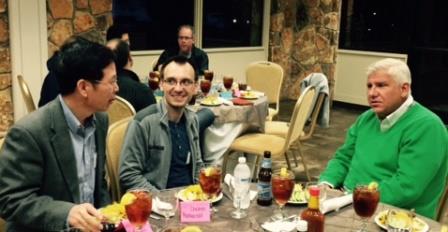 alumnus of the UAB Department of Microbiology, having received his Ph.D. in molecular cell biology in 1985. He studied Mycobacterium leprae, the causative agent of leprosy, while in the laboratories of Drs. Roy Curtiss III and Josephine Clark-Curtiss. After receiving his Ph.D., he accepted a postdoctoral position in the Department of Microbiology and Immunology at Albert Einstein College of Medicine with Dr. Barry Bloom, studying Mycobacterium tuberculosis. Bill established his own laboratory at Einstein in 1987. His contributions to this field have been enormous and well recognized. He has been a Howard Hughes Investigator since 1990, and in 2013 he was elected to the US National Academy of Science. In his talk at the retreat, Bill delighted the audience with highlights of his scientific discoveries, including the “Bronx bomber,” a highly virulent bacteriophage, lytic for certain mycobacteria, which he isolated from soil in his backyard in the Bronx and which has been instrumental for genetic analysis of these organisms. His talk was insightful, entertaining and even had an audience participation component. It was in the true sense of an overused word, awesome.
alumnus of the UAB Department of Microbiology, having received his Ph.D. in molecular cell biology in 1985. He studied Mycobacterium leprae, the causative agent of leprosy, while in the laboratories of Drs. Roy Curtiss III and Josephine Clark-Curtiss. After receiving his Ph.D., he accepted a postdoctoral position in the Department of Microbiology and Immunology at Albert Einstein College of Medicine with Dr. Barry Bloom, studying Mycobacterium tuberculosis. Bill established his own laboratory at Einstein in 1987. His contributions to this field have been enormous and well recognized. He has been a Howard Hughes Investigator since 1990, and in 2013 he was elected to the US National Academy of Science. In his talk at the retreat, Bill delighted the audience with highlights of his scientific discoveries, including the “Bronx bomber,” a highly virulent bacteriophage, lytic for certain mycobacteria, which he isolated from soil in his backyard in the Bronx and which has been instrumental for genetic analysis of these organisms. His talk was insightful, entertaining and even had an audience participation component. It was in the true sense of an overused word, awesome.
 alumnus of the UAB Department of Microbiology, having received his Ph.D. in molecular cell biology in 1985. He studied Mycobacterium leprae, the causative agent of leprosy, while in the laboratories of Drs. Roy Curtiss III and Josephine Clark-Curtiss. After receiving his Ph.D., he accepted a postdoctoral position in the Department of Microbiology and Immunology at Albert Einstein College of Medicine with Dr. Barry Bloom, studying Mycobacterium tuberculosis. Bill established his own laboratory at Einstein in 1987. His contributions to this field have been enormous and well recognized. He has been a Howard Hughes Investigator since 1990, and in 2013 he was elected to the US National Academy of Science. In his talk at the retreat, Bill delighted the audience with highlights of his scientific discoveries, including the “Bronx bomber,” a highly virulent bacteriophage, lytic for certain mycobacteria, which he isolated from soil in his backyard in the Bronx and which has been instrumental for genetic analysis of these organisms. His talk was insightful, entertaining and even had an audience participation component. It was in the true sense of an overused word, awesome.
alumnus of the UAB Department of Microbiology, having received his Ph.D. in molecular cell biology in 1985. He studied Mycobacterium leprae, the causative agent of leprosy, while in the laboratories of Drs. Roy Curtiss III and Josephine Clark-Curtiss. After receiving his Ph.D., he accepted a postdoctoral position in the Department of Microbiology and Immunology at Albert Einstein College of Medicine with Dr. Barry Bloom, studying Mycobacterium tuberculosis. Bill established his own laboratory at Einstein in 1987. His contributions to this field have been enormous and well recognized. He has been a Howard Hughes Investigator since 1990, and in 2013 he was elected to the US National Academy of Science. In his talk at the retreat, Bill delighted the audience with highlights of his scientific discoveries, including the “Bronx bomber,” a highly virulent bacteriophage, lytic for certain mycobacteria, which he isolated from soil in his backyard in the Bronx and which has been instrumental for genetic analysis of these organisms. His talk was insightful, entertaining and even had an audience participation component. It was in the true sense of an overused word, awesome.The retreat concluded on Sunday morning with three interesting talks by departmental faculty members, Drs. Dave Bedwell, Hui Hu (a new recruit to the department) and Jan Novak. This was followed by the awards ceremony with closing remarks by department chair, Dr. Fran Lund, during which she announced that our department had received the UAB Dean’s Award for Excellence.
| 2014 RESEARCH RETREAT AWARD RECIPIENTS |
|
| ORAL PRESENTATIONS Graduate Students 1st - Kathryn Doornbos 2nd - Lindsey Padgett New Investigators 1st - Shannon Ramano 2nd - Alex Dalecki Postdoctoral Fellow 1st - Shannon Kahan 2nd - Jianlin Geng |
POSTER PRESENTATIONS Graduate Students 1st - Yuan Tian 1st - Xiaojiao Xue 2nd - Gwendolyn Gunn New Investigators 1st - Brady Spencer 2nd - Katherine Taylor Postdoctoral Fellow 1st - Avi Mitra 2nd - Kanupriya Gupta |
UAB Alumnus Writes Model F31 Grant Application
By:
Published Date: Oct 20
 While doing graduate research in the UAB microbiology department, alumnus Juan Calix, M.D., Ph.D., wrote an F31 grant application that was not only funded, but also selected by NIH as a model application. According to NIH Program Specialist Jen Sacchetti, Calix’s excellent F31 application is posted on the NIH public website as a sample for the extramural researcher community.
While doing graduate research in the UAB microbiology department, alumnus Juan Calix, M.D., Ph.D., wrote an F31 grant application that was not only funded, but also selected by NIH as a model application. According to NIH Program Specialist Jen Sacchetti, Calix’s excellent F31 application is posted on the NIH public website as a sample for the extramural researcher community.
“His application mentions the research strength at UAB, and various programs including UAB MSTP,” says Moon Nahm, M.D., Calix’s mentor.
Calix received several awards while studying at UAB, including the 2012 Samuel B. Barker Award for Excellence in Graduate Studies, the most prestigious annual award given to students from the Graduate School.
In 2014, after receiving his MD/PHD at UAB, Calix began a medical internship at Washington University in St. Louis. He is in a special faculty training program where he can do research in the late phase of his residency training and can be an infectious diseases faculty member there.
"I believe that he will soon be a leader in infectious diseases and microbiology,” says Nahm. “Clearly, Juan is a model student for UAB.”
The model F31 application is on the NIH/NIAID website -- http://www.niaid.nih.gov/researchfunding/grant/samples/Pages/F31-Calix.aspx
 While doing graduate research in the UAB microbiology department, alumnus Juan Calix, M.D., Ph.D., wrote an F31 grant application that was not only funded, but also selected by NIH as a model application. According to NIH Program Specialist Jen Sacchetti, Calix’s excellent F31 application is posted on the NIH public website as a sample for the extramural researcher community.
While doing graduate research in the UAB microbiology department, alumnus Juan Calix, M.D., Ph.D., wrote an F31 grant application that was not only funded, but also selected by NIH as a model application. According to NIH Program Specialist Jen Sacchetti, Calix’s excellent F31 application is posted on the NIH public website as a sample for the extramural researcher community.“His application mentions the research strength at UAB, and various programs including UAB MSTP,” says Moon Nahm, M.D., Calix’s mentor.
Calix received several awards while studying at UAB, including the 2012 Samuel B. Barker Award for Excellence in Graduate Studies, the most prestigious annual award given to students from the Graduate School.
In 2014, after receiving his MD/PHD at UAB, Calix began a medical internship at Washington University in St. Louis. He is in a special faculty training program where he can do research in the late phase of his residency training and can be an infectious diseases faculty member there.
"I believe that he will soon be a leader in infectious diseases and microbiology,” says Nahm. “Clearly, Juan is a model student for UAB.”
The model F31 application is on the NIH/NIAID website -- http://www.niaid.nih.gov/researchfunding/grant/samples/Pages/F31-Calix.aspx
Saad receives Promotion
By:
Published Date: Aug 19
Congratulations to Dr. Jamil Saad who has been promoted to tenured Associate Professor of Microbiology
Saad and Steyn Receive Promotion
By:
Published Date: Aug 13
Congratulations to Dr. Jamil Saad who has been promoted to tenured Associate Professor of Microbiology and Dr. Adrie Steyn who has been promoted to tenured Full Professor of Microbiology.
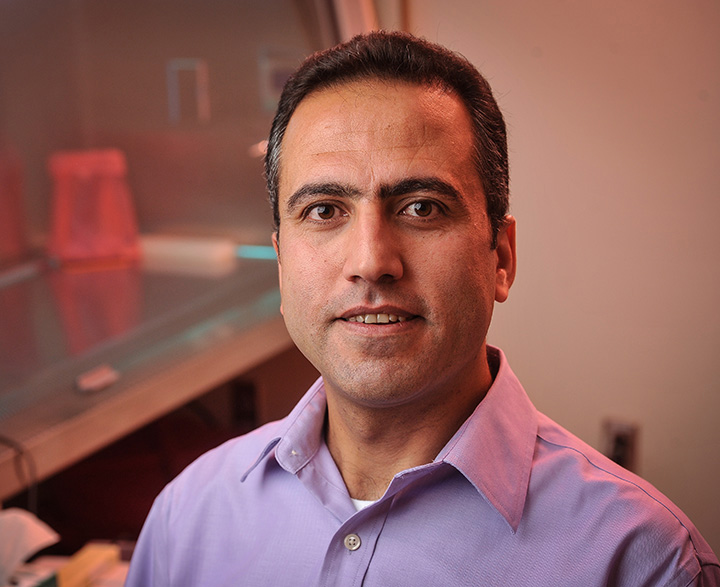 Jamil Saad Jamil Saad |
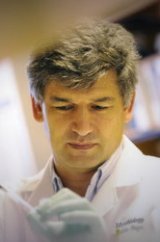 Adrie Steyn Adrie Steyn |
UAB Microbiology Department Welcomes New Faculty Member
By:
Published Date: Jun 06
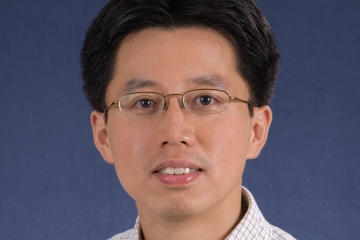 Meet Hui Hu, Ph.D., an immunologist focusing on transcriptional regulation of adaptive immunity—Tfh cell differentiation, GC responses, CD8+ T cell quiescence/activation, T cell responses, immune memory and vaccines.
Meet Hui Hu, Ph.D., an immunologist focusing on transcriptional regulation of adaptive immunity—Tfh cell differentiation, GC responses, CD8+ T cell quiescence/activation, T cell responses, immune memory and vaccines.
Hu, who comes to UAB from the Wistar Institute in Philadelphia, joined the microbiology department in May.
After receiving his doctorate from Stockholm University, Stockholm, Sweden, in 1998, Hu came to the US and began postdoctoral training at the Trudeau Institute. He then moved to the Center for Cancer Research at MIT, where he was a postdoctoral associate. In 2002, Hu joined CBR Institute for Biomedical Research (IDI) at Harvard Medical School. He was an instructor in the Department of Pediatrics at Harvard’s Children’s Hospital before moving to the Wistar Institute in 2007. He worked for seven years at the Wistar Institute. Hu has received several awards and honors including the ACGT Young Investigator Award. Read more
 Meet Hui Hu, Ph.D., an immunologist focusing on transcriptional regulation of adaptive immunity—Tfh cell differentiation, GC responses, CD8+ T cell quiescence/activation, T cell responses, immune memory and vaccines.
Meet Hui Hu, Ph.D., an immunologist focusing on transcriptional regulation of adaptive immunity—Tfh cell differentiation, GC responses, CD8+ T cell quiescence/activation, T cell responses, immune memory and vaccines. Hu, who comes to UAB from the Wistar Institute in Philadelphia, joined the microbiology department in May.
After receiving his doctorate from Stockholm University, Stockholm, Sweden, in 1998, Hu came to the US and began postdoctoral training at the Trudeau Institute. He then moved to the Center for Cancer Research at MIT, where he was a postdoctoral associate. In 2002, Hu joined CBR Institute for Biomedical Research (IDI) at Harvard Medical School. He was an instructor in the Department of Pediatrics at Harvard’s Children’s Hospital before moving to the Wistar Institute in 2007. He worked for seven years at the Wistar Institute. Hu has received several awards and honors including the ACGT Young Investigator Award. Read more
UAB Microbiology Department Welcomes New Faculty Member (2)
By:
Published Date: Jun 06
 Meet Hui Hu, Ph.D., an immunologist focusing on transcriptional regulation of adaptive immunity—Tfh cell differentiation, GC responses, CD8+ T cell quiescence/activation, T cell responses, immune memory and vaccines.
Meet Hui Hu, Ph.D., an immunologist focusing on transcriptional regulation of adaptive immunity—Tfh cell differentiation, GC responses, CD8+ T cell quiescence/activation, T cell responses, immune memory and vaccines.
Hu, who comes to UAB from the Wistar Institute in Philadelphia, joined the microbiology department in May.
After receiving his doctorate from Stockholm University, Stockholm, Sweden, in 1998, Hu came to the US and began postdoctoral training at the Trudeau Institute. He then moved to the Center for Cancer Research at MIT, where he was a postdoctoral associate. In 2002, Hu joined CBR Institute for Biomedical Research (IDI) at Harvard Medical School. He was an instructor in the Department of Pediatrics at Harvard’s Children’s Hospital before moving to the Wistar Institute in 2007. He worked for seven years at the Wistar Institute. Hu has received several awards and honors including the ACGT Young Investigator Award.
Hu’s research at UAB will focus on how to induce a primary antibody response like a memory one. “The humoral immune response is one of the two effector arms of the immune system,” explains Hu. “Studies have shown that CD4+ T follicular helper (Tfh) cells are essential for long-lived, high affinity antibody responses. Yet the complex regulation that determines the initial development of Tfh cells, their developmental progression in germinal centers (GC), and their fates after an immune response dissolves, is still not fully understood. Recently, my research has shown that transcription factor Foxp1 is a rate-limiting and essential negative regulator of Tfh cell differentiation, drastically affecting GC and antibody responses (Nat. Immunol. 2014).”
“Usually your initial immune antibody response to an infectious agent takes about a week, and is relatively weak.” Hu says. “Now we have found an important regulatory step that could allow us to induce antibody responses more faster-acting and effective. And in the other way around, we may also be able to significantly dampen the antibody responses that are unwanted in some cases of autoimmune diseases such as lupus.”
Hu’s laboratory is also working to find a way to activate T cells under immunosuppressive circumstance. “Much of our understanding of molecular mechanisms regulating immune responses is centered on pathways and processes that promote cell activation, division and differentiation,” says Hu. “My research has already demonstrated that cell-intrinsic signaling pathways are required to maintain mature T cells in a quiescent state (Nat. Immunol. 2011). If these pathways are disrupted, resting T cells become aberrantly activated even in the absence of antigen challenge. My next step is to identify regulatory genes and pathways that actively restrain T cell activation, and define the roles of such negative regulatory pathways in controlling T cell quiescence, effector responses, memory maintenance, and tumor immunology.”
 Meet Hui Hu, Ph.D., an immunologist focusing on transcriptional regulation of adaptive immunity—Tfh cell differentiation, GC responses, CD8+ T cell quiescence/activation, T cell responses, immune memory and vaccines.
Meet Hui Hu, Ph.D., an immunologist focusing on transcriptional regulation of adaptive immunity—Tfh cell differentiation, GC responses, CD8+ T cell quiescence/activation, T cell responses, immune memory and vaccines. Hu, who comes to UAB from the Wistar Institute in Philadelphia, joined the microbiology department in May.
After receiving his doctorate from Stockholm University, Stockholm, Sweden, in 1998, Hu came to the US and began postdoctoral training at the Trudeau Institute. He then moved to the Center for Cancer Research at MIT, where he was a postdoctoral associate. In 2002, Hu joined CBR Institute for Biomedical Research (IDI) at Harvard Medical School. He was an instructor in the Department of Pediatrics at Harvard’s Children’s Hospital before moving to the Wistar Institute in 2007. He worked for seven years at the Wistar Institute. Hu has received several awards and honors including the ACGT Young Investigator Award.
Hu’s research at UAB will focus on how to induce a primary antibody response like a memory one. “The humoral immune response is one of the two effector arms of the immune system,” explains Hu. “Studies have shown that CD4+ T follicular helper (Tfh) cells are essential for long-lived, high affinity antibody responses. Yet the complex regulation that determines the initial development of Tfh cells, their developmental progression in germinal centers (GC), and their fates after an immune response dissolves, is still not fully understood. Recently, my research has shown that transcription factor Foxp1 is a rate-limiting and essential negative regulator of Tfh cell differentiation, drastically affecting GC and antibody responses (Nat. Immunol. 2014).”
“Usually your initial immune antibody response to an infectious agent takes about a week, and is relatively weak.” Hu says. “Now we have found an important regulatory step that could allow us to induce antibody responses more faster-acting and effective. And in the other way around, we may also be able to significantly dampen the antibody responses that are unwanted in some cases of autoimmune diseases such as lupus.”
Hu’s laboratory is also working to find a way to activate T cells under immunosuppressive circumstance. “Much of our understanding of molecular mechanisms regulating immune responses is centered on pathways and processes that promote cell activation, division and differentiation,” says Hu. “My research has already demonstrated that cell-intrinsic signaling pathways are required to maintain mature T cells in a quiescent state (Nat. Immunol. 2011). If these pathways are disrupted, resting T cells become aberrantly activated even in the absence of antigen challenge. My next step is to identify regulatory genes and pathways that actively restrain T cell activation, and define the roles of such negative regulatory pathways in controlling T cell quiescence, effector responses, memory maintenance, and tumor immunology.”
Faculty Retreat to Birmingham Botanical Gardens
By:
Published Date: May 21
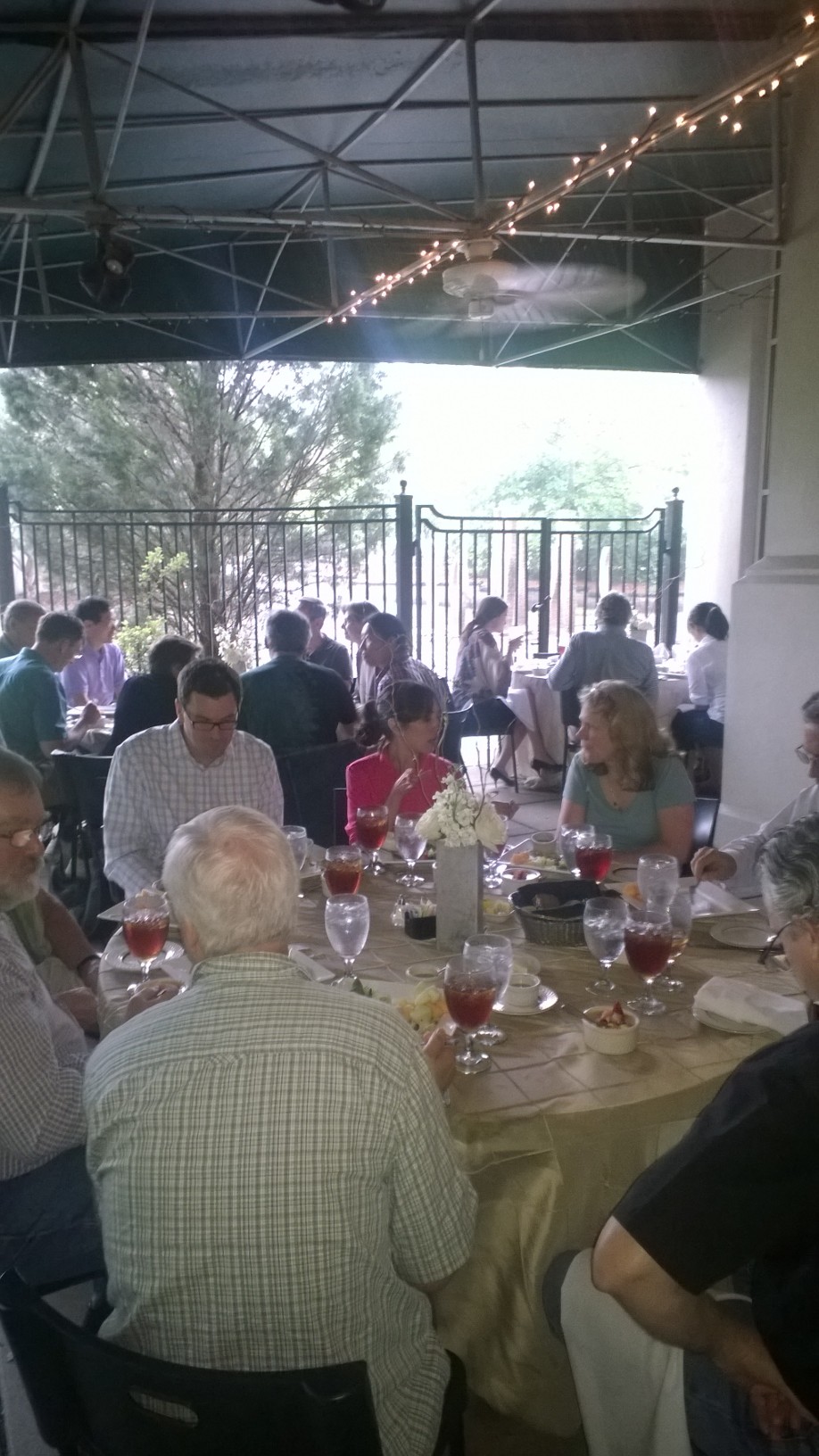 Informative, beneficial, vibrant . . . these three words describe the 2014 Microbiology Faculty Retreat, which was held on Wednesday, May 14th at the Birmingham Botanical Gardens. Dr. Fran Lund, chair of the department says, “The turnout was great, and our discussion sessions were especially good this year.
Informative, beneficial, vibrant . . . these three words describe the 2014 Microbiology Faculty Retreat, which was held on Wednesday, May 14th at the Birmingham Botanical Gardens. Dr. Fran Lund, chair of the department says, “The turnout was great, and our discussion sessions were especially good this year.
The faculty retreat is a valuable event that focuses on the two major objectives of the department—scientific research and education. Dr. Louis Justement says that the event “provides a venue for the diverse faculty to share research and ideas regarding ways to improve the department. Basically, the retreat is very valuable because it fosters communication between the faculty and communication is the key to building collaborations and for making the department stronger.”
Read more
 Informative, beneficial, vibrant . . . these three words describe the 2014 Microbiology Faculty Retreat, which was held on Wednesday, May 14th at the Birmingham Botanical Gardens. Dr. Fran Lund, chair of the department says, “The turnout was great, and our discussion sessions were especially good this year.
Informative, beneficial, vibrant . . . these three words describe the 2014 Microbiology Faculty Retreat, which was held on Wednesday, May 14th at the Birmingham Botanical Gardens. Dr. Fran Lund, chair of the department says, “The turnout was great, and our discussion sessions were especially good this year.The faculty retreat is a valuable event that focuses on the two major objectives of the department—scientific research and education. Dr. Louis Justement says that the event “provides a venue for the diverse faculty to share research and ideas regarding ways to improve the department. Basically, the retreat is very valuable because it fosters communication between the faculty and communication is the key to building collaborations and for making the department stronger.”
Read more
2014 UAB Pneumococcal Symposium
By:
Published Date: Apr 28
| What began in the late 1990s with only three UAB labs (Briles, Yother and Hollingshead) participating has become a biannual symposium attended by more than 70 attendees from six southeastern research institutions: UAB Wake Forest School of Medicine Mississippi State University University of Georgia University of Mississippi Medical Center Alabama State University |
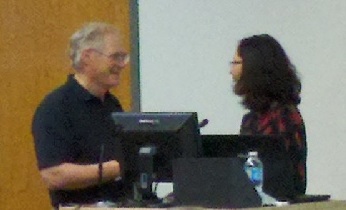 Dr. David Briles speaks with Thelma Tower, a student from Mississippi State University, before her presentation. Dr. David Briles speaks with Thelma Tower, a student from Mississippi State University, before her presentation. |
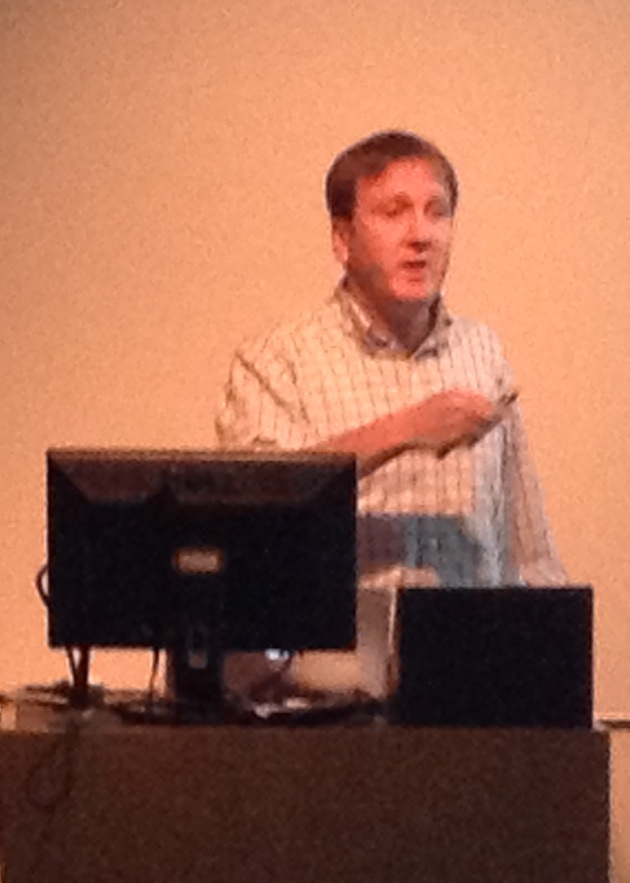 Dr. Fikri Avci, University of Georgia Dr. Fikri Avci, University of Georgia |
This two-day symposium offers researchers an opportunity to share the latest developments in the field of pneumococcal research. Distinguished speaker for the 2014 event was UAB microbiology alumni, William E. Swords, Ph.D. He discussed his research at Wake Forest School of Medicine, which focuses on understanding host-pathogen interactions that determine persistence vs. clearance in the airways. |
Saad Honored for Work with Undergraduates
By:
Published Date: Apr 07
 Congratulations to Dr. Jamil Saad for receiving the 2014 Provost's Award for Faculty Excellence in Academic Engagement and Global Citizenship. He is one of only four faculty members campus-wide to receive this honor. The award recognizes UAB faculty members for engaging undergraduate students in research, creative activities, service learning, and study abroad activities. Awards will be presented at the UAB Expo Award ceremony Friday, April 11, 2014.
Congratulations to Dr. Jamil Saad for receiving the 2014 Provost's Award for Faculty Excellence in Academic Engagement and Global Citizenship. He is one of only four faculty members campus-wide to receive this honor. The award recognizes UAB faculty members for engaging undergraduate students in research, creative activities, service learning, and study abroad activities. Awards will be presented at the UAB Expo Award ceremony Friday, April 11, 2014.
 Congratulations to Dr. Jamil Saad for receiving the 2014 Provost's Award for Faculty Excellence in Academic Engagement and Global Citizenship. He is one of only four faculty members campus-wide to receive this honor. The award recognizes UAB faculty members for engaging undergraduate students in research, creative activities, service learning, and study abroad activities. Awards will be presented at the UAB Expo Award ceremony Friday, April 11, 2014.
Congratulations to Dr. Jamil Saad for receiving the 2014 Provost's Award for Faculty Excellence in Academic Engagement and Global Citizenship. He is one of only four faculty members campus-wide to receive this honor. The award recognizes UAB faculty members for engaging undergraduate students in research, creative activities, service learning, and study abroad activities. Awards will be presented at the UAB Expo Award ceremony Friday, April 11, 2014.Speaking Out for Research
By:
Published Date: Apr 01
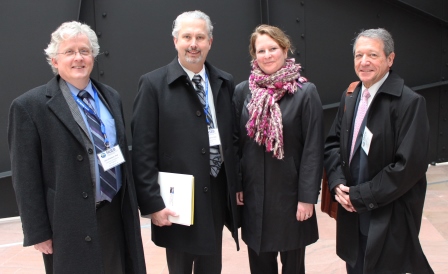 On March 5, 2014, Drs. Lou Justement (Microbiology), Beth Brown (Epidemiology and Microbiology) and John Chatham (Pathology) travelled to Washington D.C., in between snow storms, to participate in the 2014 Federation of American Societies for Experimental Biology (FASEB) Capitol Hill Day visit. They were accompanied by Joel M. Widder from the Oldaker Group who served as the group liaison.
On March 5, 2014, Drs. Lou Justement (Microbiology), Beth Brown (Epidemiology and Microbiology) and John Chatham (Pathology) travelled to Washington D.C., in between snow storms, to participate in the 2014 Federation of American Societies for Experimental Biology (FASEB) Capitol Hill Day visit. They were accompanied by Joel M. Widder from the Oldaker Group who served as the group liaison.
The FASEB Capitol Hill Day is an annual event during which members of the FASEB Board and Science Policy Committee go to Capitol Hill to meet with their legislators to request increased support for the NIH and NSF. Drs. Justement, Brown and Chatham met with staff from Senators Shelby and Sessions offices as well as Representative Sewell’s office. They also had an opportunity to meet directly with Representative Bachus to discuss the important role that UAB plays in the economic growth of Alabama and how its activities foster improved health for the state. Representative Bachus was very supportive as were all of the legislators that they spoke with.
A summary of the FASEB Capitol Hill Day visit for 2014 prepared by Jennifer Zeitzer of FASEB can be viewed here.
Activities such as these are important to raise awareness of the effects that decreased support for NIH and NSF have on the future of biomedical research in the US. If anyone has an interest in speaking out on behalf of biomedical research, they should contact Drs. Justement, Brown or Chatham for advice. Additionally, most professional societies have active public affairs offices that are willing to arrange visits to Capitol Hill. Remember, you can take the initiative to contact your legislators at any time by email or phone, and be sure to respond to requests to contact your legislator sent out by FASEB or other societies. The more often Congressional legislators hear from the scientific community, the more likely they will be to appreciate the importance of the NIH and NSF.
 On March 5, 2014, Drs. Lou Justement (Microbiology), Beth Brown (Epidemiology and Microbiology) and John Chatham (Pathology) travelled to Washington D.C., in between snow storms, to participate in the 2014 Federation of American Societies for Experimental Biology (FASEB) Capitol Hill Day visit. They were accompanied by Joel M. Widder from the Oldaker Group who served as the group liaison.
On March 5, 2014, Drs. Lou Justement (Microbiology), Beth Brown (Epidemiology and Microbiology) and John Chatham (Pathology) travelled to Washington D.C., in between snow storms, to participate in the 2014 Federation of American Societies for Experimental Biology (FASEB) Capitol Hill Day visit. They were accompanied by Joel M. Widder from the Oldaker Group who served as the group liaison. The FASEB Capitol Hill Day is an annual event during which members of the FASEB Board and Science Policy Committee go to Capitol Hill to meet with their legislators to request increased support for the NIH and NSF. Drs. Justement, Brown and Chatham met with staff from Senators Shelby and Sessions offices as well as Representative Sewell’s office. They also had an opportunity to meet directly with Representative Bachus to discuss the important role that UAB plays in the economic growth of Alabama and how its activities foster improved health for the state. Representative Bachus was very supportive as were all of the legislators that they spoke with.
A summary of the FASEB Capitol Hill Day visit for 2014 prepared by Jennifer Zeitzer of FASEB can be viewed here.
Activities such as these are important to raise awareness of the effects that decreased support for NIH and NSF have on the future of biomedical research in the US. If anyone has an interest in speaking out on behalf of biomedical research, they should contact Drs. Justement, Brown or Chatham for advice. Additionally, most professional societies have active public affairs offices that are willing to arrange visits to Capitol Hill. Remember, you can take the initiative to contact your legislators at any time by email or phone, and be sure to respond to requests to contact your legislator sent out by FASEB or other societies. The more often Congressional legislators hear from the scientific community, the more likely they will be to appreciate the importance of the NIH and NSF.
Chaplin Has Paper in Pillars of Immunology
By:
Published Date: Mar 25
Congratulations to Dr. David Chaplin whose paper “Abnormal Development of Peripheral Lymphoid Organs in Mice Deficient in Lymphotoxin” has been selected for inclusion in the Pillars of Immunology, a feature of The Journal of Immunology.
The paper, originally published in Science, April 1994, is regarded as a classic in the field. It has been republished with additional commentary included. Papers selected as Pillars of Immunology features give younger immunologists the opportunity to see what research has come before and how it has led to research today. Pillars articles are published in the first issue each month of The Journal of Immunology.
As part of its centennial celebrations, The American Association of Immunologists has made available the collected Pillars of Immunology commentaries in a downloadable format.
The paper, originally published in Science, April 1994, is regarded as a classic in the field. It has been republished with additional commentary included. Papers selected as Pillars of Immunology features give younger immunologists the opportunity to see what research has come before and how it has led to research today. Pillars articles are published in the first issue each month of The Journal of Immunology.
As part of its centennial celebrations, The American Association of Immunologists has made available the collected Pillars of Immunology commentaries in a downloadable format.
Chaplin Has Paper in Pillars of Immunology
By:
Published Date: Mar 25
Congratulations to Dr. David Chaplin whose paper “Abnormal Development of Peripheral Lymphoid Organs in Mice Deficient in Lymphotoxin” has been selected for inclusion in the Pillars of Immunology, a feature of The Journal of Immunology.
The paper, originally published in Science, April 1994, is regarded as a classic in the field. It has been republished with additional commentary included. Papers selected as Pillars of Immunology features give younger immunologists the opportunity to see what research has come before and how it has led to research today. Pillars articles are published in the first issue each month of The Journal of Immunology.
As part of its centennial celebrations, The American Association of Immunologists has made available the collected Pillars of Immunology commentaries in a downloadable format.
The paper, originally published in Science, April 1994, is regarded as a classic in the field. It has been republished with additional commentary included. Papers selected as Pillars of Immunology features give younger immunologists the opportunity to see what research has come before and how it has led to research today. Pillars articles are published in the first issue each month of The Journal of Immunology.
As part of its centennial celebrations, The American Association of Immunologists has made available the collected Pillars of Immunology commentaries in a downloadable format.
Bliss Chang Named 2014 Goldwater Scholar
By:
Published Date: Mar 21
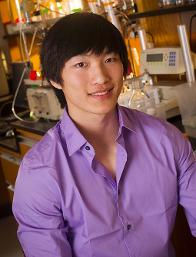 Congratulations to Bliss Chang, an undergraduate student in Dr. Jamil Saad’s lab, who was named a 2014 Goldwater Scholar by the Barry M. Goldwater Scholarship in Excellence in Education Foundation.
Congratulations to Bliss Chang, an undergraduate student in Dr. Jamil Saad’s lab, who was named a 2014 Goldwater Scholar by the Barry M. Goldwater Scholarship in Excellence in Education Foundation.
Chang, a Biochemistry and Biology major, plans to pursue an M.D./Ph.D. that will allow him to enter academic medicine and teach at a leading medical research university. His work in the Saad lab involves further elucidating the structural basis for Fas-mediated apoptosis and investigating the role of a point mutation in the Fas protein that may reveal the mechanism of inhibition for the Fas pathway.
The Barry Goldwater Scholarship and Excellence in Education Program was established by Congress in 1986 to honor Senator Barry Goldwater, who served his country for 56 years as a soldier and statesman, including 30 years of service in the U.S. Senate. The purpose of the Foundation is to provide a continuing source of highly qualified scientists, mathematicians, and engineers by awarding scholarships to college students who intend to pursue research careers in these fields.
 Congratulations to Bliss Chang, an undergraduate student in Dr. Jamil Saad’s lab, who was named a 2014 Goldwater Scholar by the Barry M. Goldwater Scholarship in Excellence in Education Foundation.
Congratulations to Bliss Chang, an undergraduate student in Dr. Jamil Saad’s lab, who was named a 2014 Goldwater Scholar by the Barry M. Goldwater Scholarship in Excellence in Education Foundation.Chang, a Biochemistry and Biology major, plans to pursue an M.D./Ph.D. that will allow him to enter academic medicine and teach at a leading medical research university. His work in the Saad lab involves further elucidating the structural basis for Fas-mediated apoptosis and investigating the role of a point mutation in the Fas protein that may reveal the mechanism of inhibition for the Fas pathway.
The Barry Goldwater Scholarship and Excellence in Education Program was established by Congress in 1986 to honor Senator Barry Goldwater, who served his country for 56 years as a soldier and statesman, including 30 years of service in the U.S. Senate. The purpose of the Foundation is to provide a continuing source of highly qualified scientists, mathematicians, and engineers by awarding scholarships to college students who intend to pursue research careers in these fields.